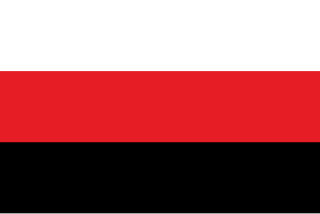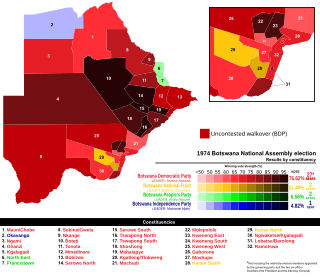
Botswana, officially the Republic of Botswana, is a landlocked country in Southern Africa. Botswana is topographically flat, with approximately 70 percent of its territory part of the Kalahari Desert. It is bordered by South Africa to the south and southeast, Namibia to the west and north, Zambia to the north and Zimbabwe to the northeast. With a population of slightly over 2.4 million people and a comparable land area to France, Botswana is one of the most sparsely populated countries in the world. It is essentially the nation-state of the Tswana people, who constitute nearly 80 percent of the population.
The history of Botswana encompasses the region's ancient and tribal history, its colonisation as the Bechuanaland Protectorate, and the present-day Republic of Botswana. The first modern humans to inhabit Botswana were the San people, and agriculture first developed approximately 2,300 years ago. The first Bantu peoples arrived c. 200 AD, and the first Tswana people arrived about 200 years later. The Tswana people split into various tribes over the following thousand years as migrations within the region continued, culminating in the Difaqane in the late 18th century. European contact first occurred in 1816, which led to the Christianization of the region.

Botswana is a parliamentary republic in which the President of Botswana is both head of state and head of government. The nation's politics are based heavily on British parliamentary politics and on traditional Batswana chiefdom. The legislature is made up of the unicameral National Assembly and the advisory body of tribal chiefs, the Ntlo ya Dikgosi. The National Assembly chooses the president, but once in office the president has significant authority over the legislature with only limited separation of powers.

Gaborone is the capital and largest city of Botswana with a population of 246,325 based on the 2022 census, about 10% of the total population of Botswana. Its agglomeration is home to 534,842 inhabitants at the 2022 census.
A councillor, alternatively councilman, councilwoman, councilperson, or council member, is someone who sits on, votes in, or is a member of, a council. This is typically an elected representative of an electoral district in a municipal or regional government, or other local authority. The title of a councillor varies geographically, with a name generally being preceded by their title in formal or council-related situations in many places.

The Botswana Democratic Party is a centre-right political party in Botswana. From the country's inaugural election in 1965 until the 2024 general election the party governed the country without interruption for 58 years. At the time of its defeat, the BDP was the longest continuous ruling party in the democratic world.

Elections in Botswana take place within the framework of a multi-party democracy and a parliamentary system. The National Assembly is mostly directly elected, and in turn elects the President and some of its own members. The Ntlo ya Dikgosi is a mixture of appointed, hereditary and indirectly elected members.

The MELS Movement of Botswana was an anti-revisionist Marxist-Leninist communist party in Botswana without parliamentary representation. Themba Joina, a practicing lawyer, was the president of the organization. The name MELS is derived from (Karl) Marx, (Friedrich) Engels, (Vladimir) Lenin and (Joseph) Stalin.

The National Assembly is the sole legislative body of Botswana's unicameral Parliament, of which consists of the President and the National Assembly. The House passes laws, provides ministers to form Cabinet, and supervises the work of government. It is also responsible for adopting the country's budgets. It is advised by the Ntlo ya Dikgosi, a council of tribal chiefs which is not a house of Parliament.

General elections were held in Botswana on 16 October 1999, alongside local elections. The result was an eighth straight victory for the ruling Botswana Democratic Party (BDP), which increased its majority to 33 of the 40 elected seats in the National Assembly.

General elections were held in Botswana on 8 September 1984. Although the result was a fifth successive landslide victory for the Botswana Democratic Party, which won 29 of the 34 elected seats, the elections saw the opposition Botswana National Front make gains, winning both seats in the capital Gaborone and take control of all urban councils except Selebi-Phikwe in the simultaneous local elections.

General elections were held in Botswana on 26 October 1974. With 205,050 registered voters, turnout was just 31.22%. The result was a third successive landslide victory for the Botswana Democratic Party (BDP), who won 27 of the 32 elected seats, including four in which they were unopposed. Local elections were held on the same day, with a turnout of just 30.3%, and saw the BDP strengthen its position.

Local elections in Botswana were held on 16 October 2009 for the district councils of the Districts of Botswana. Local government is administered by nine district and five town councils. District commissioners have executive authority.

Local elections in Botswana were held on 30 October 2004 for the district councils of the Districts of Botswana. Local government is administered by nine district and five town councils. District commissioners have executive authority.
Gladys Keitumetse Theresa Kokorwe is a Botswana politician who was the Speaker of the National Assembly from 2014 to 2019. She is a member of the Botswana Democratic Party (BDP).
The 1999 Wychavon District Council election took place on 6 May 1999 to elect members of Wychavon District Council in Worcestershire, England. The whole council was up for election and the Conservative Party gained overall control of the council from no overall control.

The 2019 Derbyshire Dales District Council election was held on 2 May 2019 to elect all 39 councillors for Derbyshire Dales District Council. This was on the same day as other local elections.

The 1995 Harlow District Council election took place on 4 May 1995 to elect members of Harlow District Council in Essex, England. This was on the same day as other local elections. The Labour Party retained control of the council, which it had held continuously since the council's creation in 1973.

The 1996 Harlow District Council election took place on 2 May 1996 to elect members of Harlow District Council in Essex, England. This was on the same day as other local elections. The Labour Party retained control of the council, which it had held continuously since the council's creation in 1973.












